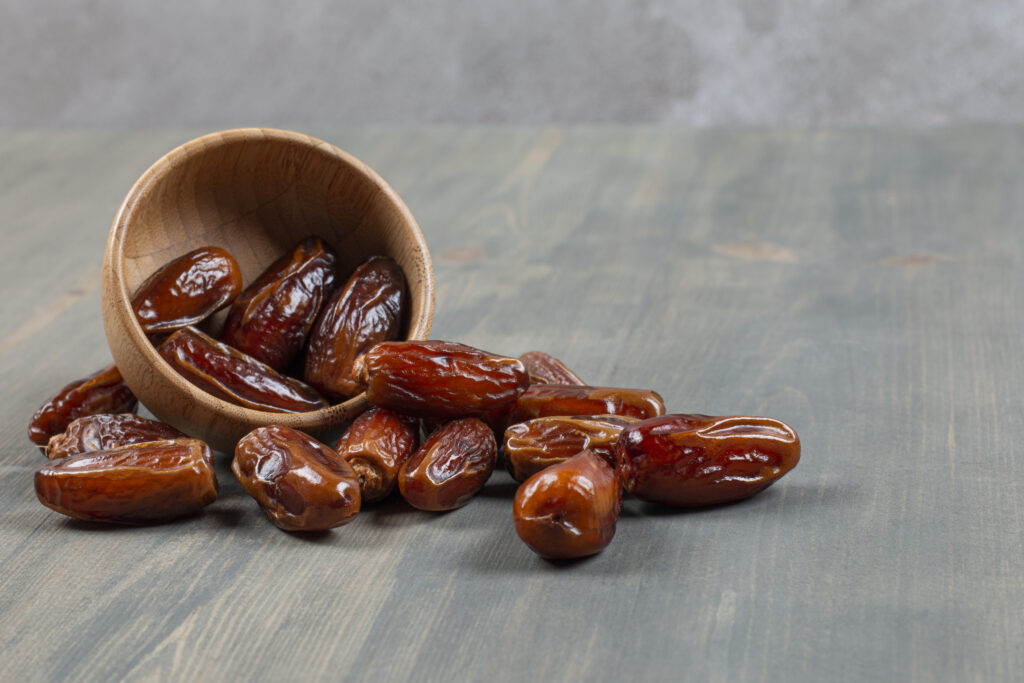Many civilizations and religions, including Islam, Judaism, and Christianity, have long practiced breaking the fast with dates. During the holy month of Ramadan, Muslims frequently eat dates to break their fast. It is said that the Prophet Muhammad (SAW) broke his fast with dates and water during the time of this practice. After a day of fasting, dates aid to restore the body’s glucose levels and offer a quick source of energy. Dates hold special cultural and religious importance in addition to being a wholesome food rich in fiber, vitamins, and minerals. They offer a natural sugar supply that can support better digestion and energy levels. Hence, breaking the fast with dates is not just a custom but also a beneficial activity.
Importance of dates in Ramadan:
Dates are commonly eaten at the time of breaking the fast during Ramadan for several reasons:
• Dates are a fantastic source of energy and include important minerals including fiber, potassium, and magnesium for the body. The body needs to recharge after a long day of fasting, and dates offer a convenient and nourishing source of energy.
• Dates are consumed to break the fast, according to the Prophet Muhammad’s Sunnah (way of life) (peace be upon him). Muslims aspire to be like him, and one way to do that is to eat dates.
• Muslims have always observed the custom of eating dates to break their fast. It is a cultural tradition that has been handed down through the years.
• In many Muslim cultures, dates are also seen as a sign of generosity and hospitality. During Ramadan, sharing dates with others is a way to demonstrate these values and build relationships within the neighborhood.
Benefits of dates In Ramadan:
Dates are a common food during Ramadan and have many health advantages. The following are a few of the main advantages of eating dates during Ramadan.
1. Energy Boost:
Dates contain a lot of natural sugars including glucose, fructose, and sucrose that the body may readily absorb and use as an immediate source of energy after a long fasting day.
When you break your fast with dates, the sugar in the dates is rapidly absorbed by the body and converted into energy, providing a quick energy boost. This can be especially helpful during Ramadan when energy levels may be low due to prolonged fasting. In addition to their natural sugar content, dates are also a good source of complex carbohydrates, which provide sustained energy over a longer period. This means that eating dates can help to maintain energy levels throughout the evening and into the night.
2. Improved Digestion:
Dates are known to improve digestion and encourage the development of healthy bacteria in the gut, both of which can lessen digestive problems like constipation. Due to their high dietary fiber content, dates can aid in promoting regular bowel movements and avoiding constipation. This can support maintaining the digestive system’s health and functionality. It includes natural sugars like sucrose, fructose, and glucose that can help the body recover quickly from a day of fasting. Additionally, by stimulating the digestive system, these sugars can aid in a more effective breakdown of food. It also has enzymes that can help break down proteins and carbohydrates, making it easier for the body to digest food. This can help reduce the risk of indigestion and other digestive problems.
3. Nutrient Rich:
A good supply of dietary fiber, vitamins, and minerals including potassium, magnesium, and iron, which are important for the body’s overall health and welfare, can be found in dates. Here are some of the nutritional facts about dates based on a 100-gram serving:
Calories: 277
Carbohydrates: 75 grams
Fiber: 7 grams
Protein: 2 grams
Fat: 0.4 grams
Potassium: 696 milligrams
Magnesium: 54 milligrams
Iron: 1 milligram
Calcium: 64 milligrams
Vitamin B6: 0.2 milligrams
Dates are also a good source of antioxidants, including phenolic acids, carotenoids, and flavonoids, which can help protect against cellular damage and chronic diseases. However, dates are also high in sugar, so they should be consumed in moderation as part of a balanced diet.
4. Regulate Blood Sugar:
Dates can assist to manage blood sugar levels and minimize spikes and crashes since they have a low glycemic index while having a high natural sugar content. Dates are a natural sweetener and include carbohydrates in the form of simple sugars such as fructose and glucose. These sugars are quickly absorbed into the bloodstream after consumption, which can result in a sharp increase in blood sugar levels. However, dates also contain fiber, which can slow down the absorption of glucose into the bloodstream and reduce blood sugar rises. Additionally contributing to satiety and lowering the overall glycemic index of a meal or snack is the fiber in dates.
5. Boost Immune System:
Antioxidants, which can assist to strengthen the immune system and protect against sickness and infection, are abundant in dates. Dates are frequently consumed during iftar and are thought to have immune-boosting properties. Antioxidants, which are rich in dates, can aid in preventing cell damage brought on by free radicals. They are also high in fiber, which can help to support digestive health and boost immunity.







